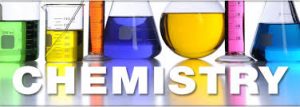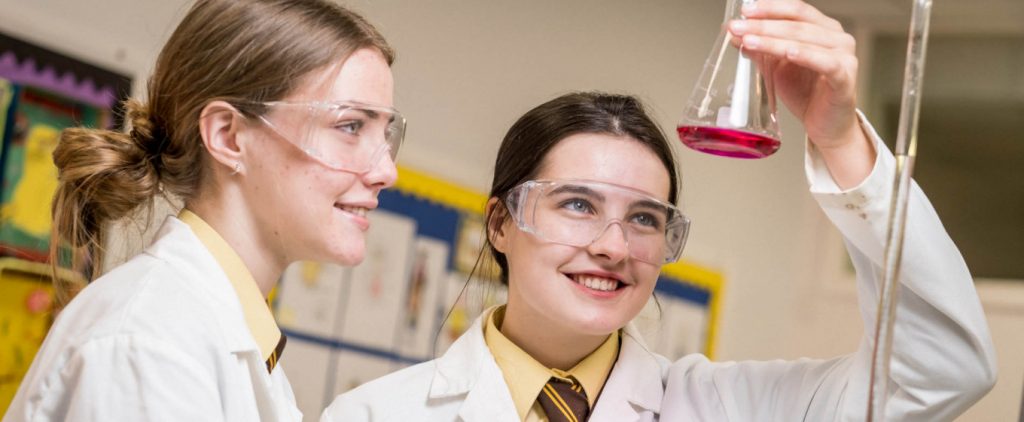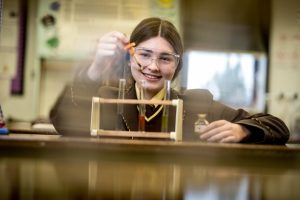A-LEVEL CHEMISTRY
A Level – Chemistry

Introduction
Chemistry is the study of elements and the compounds they form. As a fundamental science it is involved in nearly every facet of everyday life. Almost every new technological change and important discovery has its foundation in chemistry. Chemists influence our lives and make the world a better place in which to live.
Recommended GCSE Subjects and Grades
Double Award Science: AA or higher
Triple Award Chemistry: B or higher Biology
Other Contributory Subjects
Mathematics Physics
Other Information
Chemistry tests students’ powers of analysis and their ability to apply understanding of concepts and relevant knowledge to different situations. Practical skills are developed further with more wide ranging and demanding tasks.
Subject Content
AS
AS 1:Basic Concepts in Physical and Inorganic Chemistry
AS 2: Further Physical and Inorganic Chemistry and an Introduction to Organic Chemistry
AS 3: Basic Practical Chemistry
A2
A2 1: Further Physical and Organic Chemistry
A2 2: Analytical, Transition Metals, Electrochemistry and Organic Nitrogen Chemistry
A2 3: Further Practical Chemistry
Method of Assessment
AS: External written examination 1 hour 30 minutes Students answer Section A containing 10 multiple-choice questions (10 marks)
Section B containing a number of structured questions (80 marks). 40% of
AS / 16% of A level AS 2: External written examination 1 hour 30 mins Students answer Section A containing 10 multiple-choice questions (10 marks)
Section B containing a number of structured questions (80 marks).
40% of AS / 16% of A level
AS 3: Practical booklet A consists of a variety of practical tasks worth 25 marks.
Students take the examination in the laboratory. 1 hour 15 minutes
Practical booklet B consists of a variety of questions testing knowledge of practical techniques, observations and calculations worth 55 marks.
Students take the assessment in an examination hall. 1 hour 15 minutes
20% of AS / 8% of A level
A2 1: External written examination 2 hours
Students answer Section A containing 10 multiple-choice questions (10 marks)
Section B containing a number of structured questions (100 marks). 40% of A2 / 24% of A level
A2 2: External written examination 2 hours
Students answer Section A containing 10 multiple-choice questions (10 marks)
Section B containing a number of structured questions (100 marks). 40% of A2 / 24% of A level
A2 3: Practical booklet A consists of variety of practical tasks worth 30 marks.
Students take the examination in the laboratory. 1 hour 15 minutes
Practical booklet B consists of a variety of questions testing knowledge of practical techniques, observations and calculations worth 60 marks.
Students take the assessment in an examination hall. 1 hour 15 minutes.
20% of A2
12% of A level
Career Possibilities
These are endless – a chemistry qualification gives you great choice. It is useful for a wide variety of science/non science related courses and is essential for Research and Development and Biomedical Sciences, Food Science, Pharmacy, Dentistry, Life Sciences, Veterinary Science, Dietetics, Medicine.

Other Information
A Chemistry Public Speaking Competition took place in February 2019 to celebrate the 150th birthday of the Periodic Table. The highly esteemed Mr Declan Mc Geown RSC was Guest Speaker/Judge at the event.


